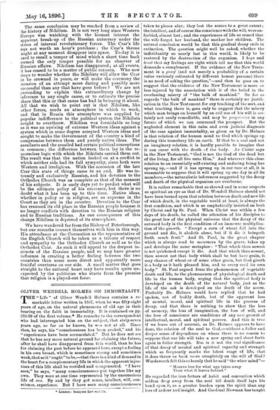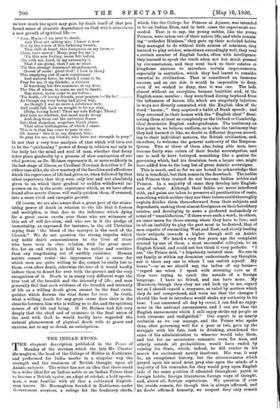OLIVER WENDELL HOLMES ON IMMORTALITY.
" Life " of Oliver Wendell Holmes contains a re-
markable letter written in 18(17, when be was fifty-eight years of age, on the natural phenomena of old age in their bearing on the faith in immortality. It is contained on pp. 288-89 of the first volume.• He remarks to the correspondent who had interrogated him on the subject, that sixty-seven years ago, so far as he knows, he was not at all. Since then, he says, his "consciousness has been evoked," and his "experiences have been accumulated." But he does not see that he has any more natural ground for claiming the future, after he shall have disappeared from this world, than he has for claiming the past before he appeared here, except a feeling in his own breast, which is sometimes strong and sometimes weak,that so it "ought" to be,—that there is a kind of demand in the heart for a complementary life in which the apparent injus- tices of this life shall be rectified and compensated. " I have seen," he says, " many conscionsnesses put together like my own. They were at one time represented by the unconscious life of ova. By and by they got sense, intellect, will, con- science, experience. But I have seen many consciousnesses
• London: Sarof202 Low and Co.
taken to pieces also; they lost the senses to a great extent; the intellect, and of course the conscience with the will, were en- feebled, almost lost; and the experiences of life so erased that the wife forgot her husband, the mother her children. The natural conclusion would be that this gradual decay ends in extinction. The question might well be asked, whether the individuality so nearly lost in this world, is likely to be restored by the destruction of the organism. I hope and trust that my feelings are right which tell me that this world demands a complement. If the evidence of the New Testa- ment is a proof (and not merely a probability of a certain value variously estimated by different honest persons) there is no need of asking the question,"—and then he goes on to suggest that the evidence of the New Testament is more or less injured by the association with it of the belief in the everlasting misery of "the balk of mankind." So far as regards "the bulk of mankind" there is certainly no justifi- cation in the New Testament for any teaching of the sort, and what teaching there is, goes only to suggest that the misery which man brings on himself by an evil use of his will is cer- tainly not easily remediable, and may be progressive in any future of which we can command the prospect. But the neglected element in this calm and even judicial diagnosis of the case against immortality, as given us by Dr. Holmes is that relation of the human mind to God which springs up during this transitory life on earth. If that be a real and not an imaginary relation, it is hardly possible to imagine that it can cease with the death of the body. As Christ says in the New Testament, " God is not the God of the dead but of the living, for all live unto Him." And wherever this close relation to an essentially self-existing and enduring being has sprung up,—and if it has sprung up in our race at all, it is reasonable to suppose that it will spring up one day in all its members,—the naturalistic inferences suggested by the decay and death of the physical organism are overborne.
It is rather remarkable that so shrewd and in some respects so spiritual an eye as that of Dr. Wendell Holmes should not have been turned upon that relation between death and new life of which death, in the vegetable world at least, is always the first condition, and which is so emphatically insisted on both by Christ and by St. Paul. When Christ was within a few days of his death, he called the attention of his disciples to the great law of the physical universe that the decay of the outward body is the first condition of an immense multiplica- tion of the growth. "Except a corn of wheat fall into the ground and die, it abideth alone, but if it die it bringeth forth much fruit." And St. Paul, in the great chapter which is always read to mourners by the grave, takes up and develops the same metaphor : " That which thou sowest is not quickened except it die. And that which thou sowest, thou sowest not that body which shall be but bare grain, it may chance of wheat or of some other grain, but God giveth it a body as it hath pleased him, and to every seed its own body." St. Paul argued from the phenomenon of vegetable death and life, to the phenomenon of physiological death and life in the human body, urging that the spiritual body is developed on the death of the natural body, just as the life of the oak is developed on the death of the acorn. Probably Dr. Holmes would have replied that be had spoken, not of bodily death, but of the apparent loss of mental, moral, and spiritual life in the process of decay, and that there is nothing to show that the loss of memory, the loss of imagination, the loss of will, and the loss of conscience are conditions of any new growth of intellectual, moral, and spiritual powers. And this is true if we leave out of account, as Dr. Holmes appears to have done, the relation of the soul to God,—without a fuller and deeper sense of dependence on whom there is no reason to suppose that our life will take a new spring and shoot forth again in fuller strength. Bat is it not the real significance of that decay of mental and spiritual capacity and strength which so frequently marks the latest stage of life, that it does throw us back more completely on the will of God ? Wordsworth felt this so keenly that he said "the wiser mind"— "Mourns less for what age takes away Than what it leaves behind."
He regarded the iron fetters of habit and convention which seldom drop away from the soul till death itself lays his hand upon it, as a greater burden upon the spirit than any loss of ardour and insight. And Cardinal Newman has taught us how much the spirit may gain by death itself of that pro- found sense of absolute dependence on God which stimulates a new growth of spiritual life :-
" Jesu, Maria—I am near to death,
And Thou art calling me; I know it now.
Not by the token of this faltering breath, This chill at heart, this dampness on my brow,— (Jesu, have mercy ! Mary, pray for me !) 'Tis this new feeling, never felt before, !Be with me, Lord, in my extremity !) That I am going, that I am no more.
'Tis this strange innermost abandonment, (Lover of souls! great God ! I look to thee,) This emptying out of each constituent And natural force, by which I come to be.
Pray for me, 0 my friends; a visitant Is knocking his dire summons at my door, The like of whom, to scare me and to daunt, Has never, never come to me before ; 'Tis death,-0 loving friends, your prayers !—'tis he As though my very being had given way, As though I was no more a substance now, And could fall back on nought to be my stay,
(Help, loving Lord ! Thou my sole Refuge, Thou,)
And turn no whither, but must needs decay And drop from out the universal frame
Into that shapeless, scopeless, blank abyss,
That utter nothingness, of which I came: This is it that has come to pass in me ; Oh, horror ! this it is, my dearest, this ; So pray for me, my friends, who have not strength to pray."
Is not that a very true analysis of that which will turn out to be the "quickening " power of decay in relation not only to
the body but the mind and soul of man, whether that decay takes place gradually by a process of slow contraction of our vital powers, as Dr. Holmes represents it, or more suddenly in the last stage of illness, as Cardinal Newman describes it ? In either case alike, the slow mastery of the faculties and affections which the experience of life had given us, when followed by that other experience that they were only lent and not absolutely given to us, which their gradual or sudden withdrawal im- presses on us, is the acute experience which, as we have often found after severe illness, will really quicken them, if restored, into a more vivid and energetic growth.
Of course, we are also aware that a great part of the stimu- lating power of death in relation to the life that it fosters and multiplies, is that due to the influence which dying for a great cause exerts over those who are witnesses of this act of self-devotion, and who see in it the pledge of immortality, as expressed, for instance, in the old Christian saying that the blood of the martyrs is the seed of the Church." We do not question the strong impulse which any noble death communicates to the lives of those who have been in close relation with the great sacri- fice for an end which is held to be nobler and worthier than any lengthening out of earthly existence. Haman nature cannot resist the impression that a cause for which men are quite willing to die, cannot be really lost to them even after death, otherwise the love of it would hardly induce them to desert for ever both the pursuit and the very recognition of it. Death is in many very different ways the true test of the breadth and the intensity of life; and men generally feel that such evidence of the breadth and intensity of life as a willing death gives, cannot be the final extin- guisher which drowns the vital flame for ever. In truth, what a willing death for any great cause does show is the close tie between him who is willing so to die, and the spiritual source of all life and being. If Dr. Holmes had felt very deeply that the chief end of existence is the final union of the soul with God, he would hardly have regarded the natural phenomenon of physical death with so grave and anxious, not to say so dread, an anticipation.







































 Previous page
Previous page